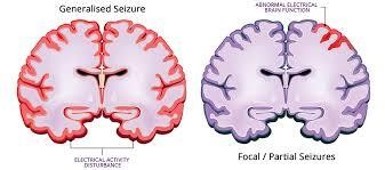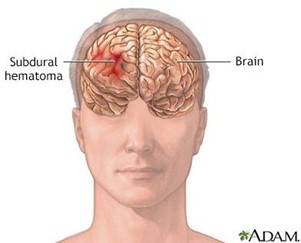A mother reports that her child has episodes where he appears to be staring into space. This behaviour is characteristic of which type of seizure?
Atonic
Absence
Simple partial
Tonic-clonic
The Correct Answer is B
The behaviour described, where the child appears to be staring into space, is characteristic of
B. Absence seizures.
Absence seizures, also known as petit mal seizures, are a type of generalized seizure that primarily affects children. These seizures are brief and usually last for a few seconds. During an absence seizure, the child may appear to be staring blankly into space, unaware of their surroundings. They may not respond to stimuli or engage in any purposeful activity.After the seizure ends, the child typically resumes their previous activity without any memory of the seizure.
Atonic seizures in (option A) is incorrect because it involves a sudden loss of muscle tone, leading to a limp or "drop"in the person.
Simple partial seizures in (option C) are focal seizures that affect a specific region of the brain, causing localizedsymptoms such as twitching or tingling in a particular body part.
Tonic-clonic seizures in (option D) also known as grand mal seizures, is incorrect because it involves a combination of muscle rigidity (tonic phase) and jerking movements (clonic phase).
Therefore, based on the description provided, the behaviour of staring into space is characteristic of B. Absence seizures. It is important for the child to be evaluated by a healthcare professional for an accurate diagnosis and appropriate management of their seizures.

Nursing Test Bank
Naxlex Comprehensive Predictor Exams
Related Questions
Correct Answer is C
Explanation
In the given scenario, the 6-year-old patient in skeletal traction is experiencing
pain, edema, and fever. These symptoms raise concerns about the possibility of an infection
at the site of traction. In such cases, the nurse should assess for warmth at the site of pain.
Increased warmth can indicate inflammation, which may be associated with infection. This
assessment finding would require further investigation and intervention, such as notifying the
healthcare provider and obtaining appropriate cultures or imaging studies.
Neurologic status in (Option A) is incorrect because assessing neurologic status, is important
but not the priority in this scenario. Neurologic status assessment is typically performed to
evaluate any neurovascular compromise resulting from the traction, but the presence of pain,
edema, and fever suggests a potential infection that requires immediate attention.
Range of motion of all extremities in (Option B) is incorrect because assessing the range of
motion of all extremities, is not directly relevant to the given symptoms and should not take
priority over assessing for warmth at the site of pain.
Blood pressure in (Option D) is incorrect because assessing blood pressure, is not directly
related to the symptoms of pain, edema, and fever in the context of skeletal traction. While
blood pressure is an essential vital sign, it does not provide specific information about the
potential infection at the site of pain in this situation.
Correct Answer is A
Explanation
A subdural hematoma is a type of intracranial bleeding that occurs between the dura mater (the
outermost layer of the meninges) and the skull. The dura mater is a tough membrane that covers
and protects the brain. When a subdural hematoma occurs, blood collects between the dura mater
and the skull, resulting in increased pressure on the brain.
Bleeding is generally arterial, and brain compression occurs rapidly in (Option B) is incorrect because
while bleeding in a subdural hematoma can be arterial, it can also be venous. The rate of bleeding
and brain compression can vary depending on the size and severity of the hematoma.
Bleeding occurs between the dura and the cerebrum in (Option C) is incorrect because the bleeding
in a subdural hematoma does not occur between the dura and the cerebrum (the largest part of the
brain). It specifically occurs between the dura and the skull.
The hematoma commonly occurs in the pretemporal region in (Option D) is incorrect because the
location of a subdural hematoma can vary. While pretemporal region is a possible location, subdural
hematomas can occur in different areas of the brain, depending on the site of injury.

Whether you are a student looking to ace your exams or a practicing nurse seeking to enhance your expertise , our nursing education contents will empower you with the confidence and competence to make a difference in the lives of patients and become a respected leader in the healthcare field.
Visit Naxlex, invest in your future and unlock endless possibilities with our unparalleled nursing education contents today
Report Wrong Answer on the Current Question
Do you disagree with the answer? If yes, what is your expected answer? Explain.
Kindly be descriptive with the issue you are facing.
